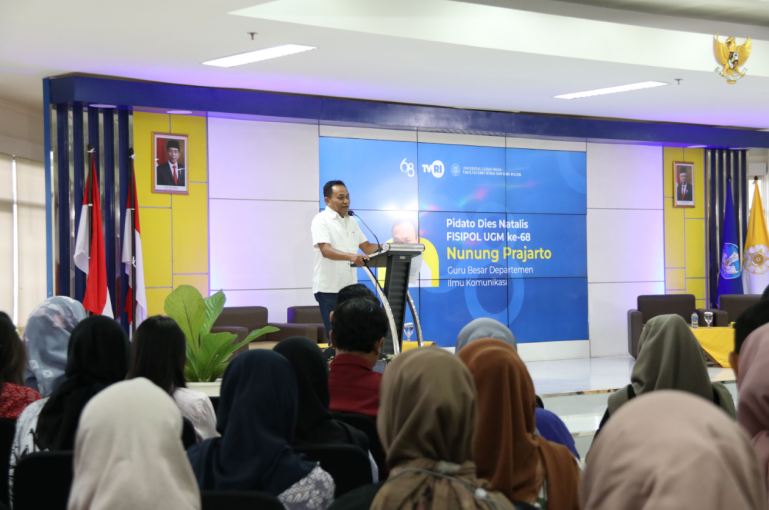
Yogyakarta, September 19th 2023─Welcoming its 68th Anniversary, the Faculty of Social and Political Sciences of Universitas Gadjah Mada organized a series of events beginning with the Opening Speech and Seminar entitled “Smart Voters for Future Indonesian Leaders”. The event was held offline on Tuesday (19/9) at the Auditorium Mandiri Fisipol UGM. Present as speakers in the talk show session were Rizal Mallarangeng, Founder of Freedom Institute; Ismail Fahmi, Founder of Drone Emprit & Media Kernels Indonesia; and Hermin Indah Wahyuni, Professor of Department of Communication Science (DIKOM) Universitas Gadjah Mada.
Nunung Prajarto, Professor of DIKOM, kicked off the event by delivering his speech titled “The Unfolding of the Scientific Gap”. In his speech, Nunung criticized the climate in academic research, which tends to play around and flow in a safe zone. “Researchers are often trapped in uncovering problems that are actually fine,” Nunung said. This can lead to the absence of a solution to a problem. Research tends to legitimize an institution. Reflecting on this phenomenon, Nunung invites researchers to start opening up and freeing themselves, not to be confined to old habits. Furthermore, Nunung also criticized the tendency of the curriculum to focus more on the downstream than the upstream. As a consequence, we see more results than sources. Nunung admits that this is indeed more attractive to the industry. “But we fail to find the source of the problem,” Nunung said.
After the speech was delivered, the event continued with a talk show session moderated by Nyarwi Ahmad, a DIKOM lecturer. In line with Nunung’s opinion on the importance of looking at the upstream area, it is also important to talk about voters who are considered by Nyarwi as the upstream of democracy. According to Rizal, it is very important for voters to be able to behave and think intelligently. Especially in the digital era where communication is very easy to establish through the existence of social media which also facilitates persuasion through rhetoric. “We have to learn how rhetoric evolves,” he said.
Fahmi agreed with Rizal’s opinion on smart voters. He said that currently, we are in the era of the attention economy that places human attention as a commodity. Furthermore, this is also accompanied by the development of a disinformation-for-profit business model. “Controversial content is more interesting and spreads faster,” Fahmi said. This makes voter intelligence even more important considering that social media algorithms and climate also support the spread of controversial content.
Finally, Hermin provided four important things needed to be a smart voter: information, rationality, digital technology, and digital literacy. According to Hermin, the information ecosystem will determine the quality of elections. In the midst of the cacophony and confusion of information circulating, people need rationality to respond to this. “Rationality in elections includes understanding the meaning of voting; activation of agency, understanding the reasons for choosing certain candidates, and intelligence to contextualize Indonesia’s essential needs,” Hermin said. Voter information and rationality, when coupled with digital technology and good digital literacy, are expected to produce smart voters.
